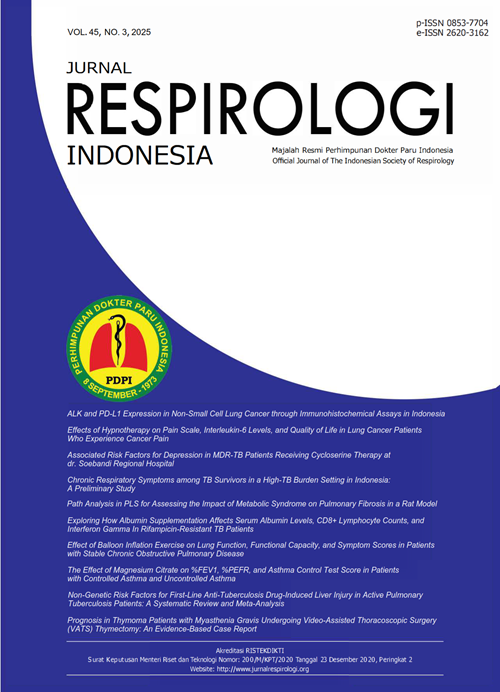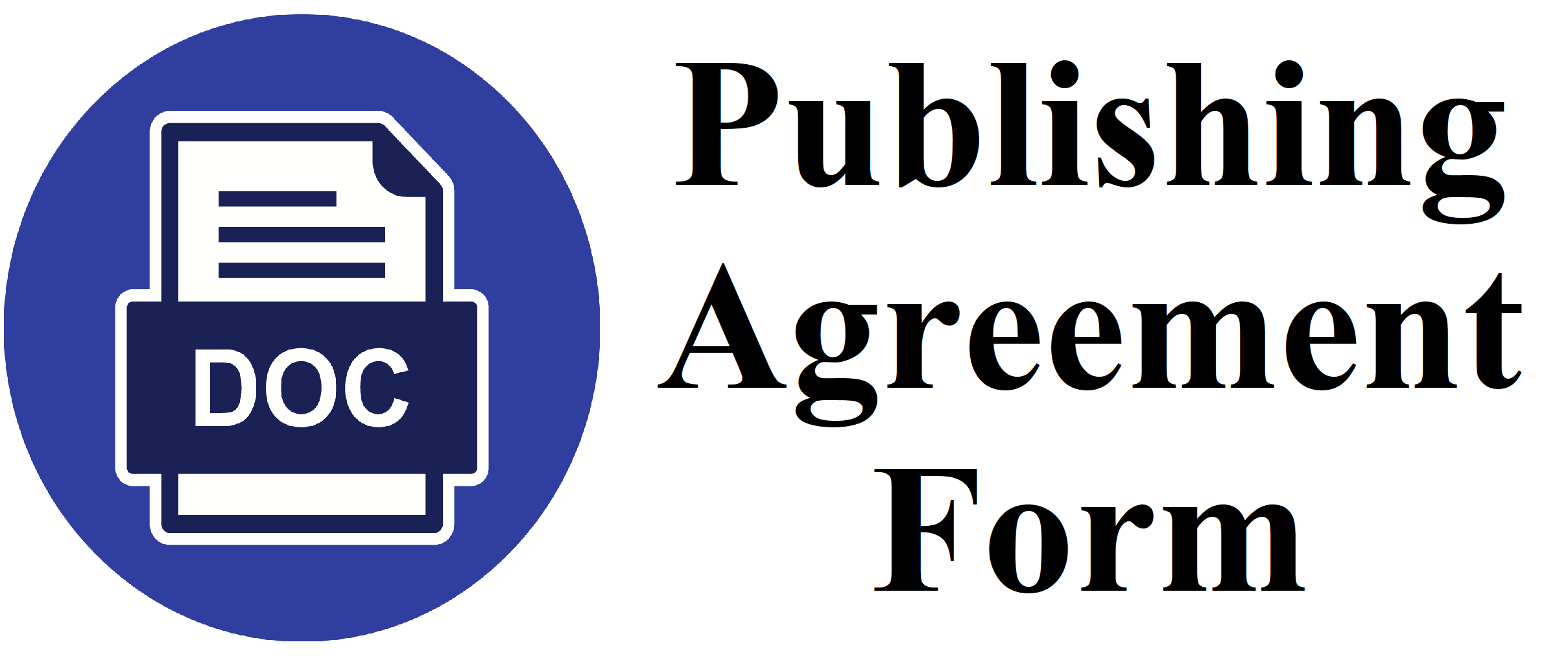The Effect of Magnesium Citrate on %FEV1, %PEFR, and Asthma Control Test Score in Patients with Controlled Asthma and Uncontrolled Asthma
DOI:
https://doi.org/10.36497/jri.v45i3.503Keywords:
%FEV1, %PEFR, ACT, asthma, magnesium citrateAbstract
Background: Asthma is one of the most common non-communicable diseases in the world and affected an estimated 262 million people in 2019. Magnesium is one of the nutrients known to improve lung function in asthma by inhibiting the production of proinflammatory cytokines, exhibiting anti-inflammatory benefits, and having beneficial muscle-relaxing and bronchodilatation effects. Measurement of percent predicted forced expiratory volume in 1 second (%FEV1), percent predicted peak expiratory flow rate (%PEFR), and asthma control test (ACT) score is are indicator of lung function. Magnesium citrate may be used as an adjunct therapy in patients with controlled and uncontrolled asthma.
Methods: Clinical trial research with quasi quasi-experimental method using a pre-test and post-test design. The study subjects were 34 controlled and uncontrolled asthma patients at the outpatient clinic of Universitas Sebelas Maret Hospital and dr. Soehadi Prijonegoro Hospital in February - March 2023, using consecutive sampling. The control group (n=17) received standard therapy, while the treatment group (n=17) received standard therapy plus 300 mg magnesium citrate for 42 days. Serum magnesium level, %FEV1, %PEFR, and ACT score were measured at enrollment and on the forty-third day of treatment.
Results: There were significant differences between the treatment group compared to the control group in increasing %PEFR (P=0.001), increasing ACT score (P=0.011), and increasing %FEV1 (P=0.071).
Conclusion: Administration of magnesium citrate to patients with controlled and uncontrolled asthma can increase levels of %PEFR, ACT score, and %FEV1.
Downloads
References
1. Global Initiative for Asthma. 2022 GINA Report, Global strategy for asthma management and prevention. 2022.
2. Stern J, Pier J, Litonjua AA. Asthma epidemiology and risk factors. Semin Immunopathol. 2020;42(1):5–15.
3. Green RH. Asthma in adults (acute): Magnesium sulfate treatment. BMJ Clin Evid. 2016;2016:1513.
4. Perhimpunan Dokter Paru Indonesia. Asma: Pedoman diagnosis dan penatalaksanaan di Indonesia. 4th ed. Yunus F, Djajalaksana S, Wiyono WH, Damayanti T, Amin M, Tarigan A, et al., editors. Jakarta: Perhimpunan Dokter Paru Indonesia; 2021. 11–29 p.
5. Borak J, Lefkowitz RY. Bronchial hyperresponsiveness. Occup Med (Chic Ill). 2016;66(2):95–105.
6. Kilic H, Kanbay A, Karalezli A, Babaoglu E, Hasanoglu HC, Erel O, et al. The relationship between hypomagnesemia and pulmonary function tests in patients with chronic asthma. Medical Principles and Practice. 2018;27(2):139–44.
7. Zilaee M, Ahmad Hosseini S. Nutritional recommendations in asthmatic patients. In: Pereira C, editor. Asthma - Biological Evidences. London: IntechOpen; 2019. p. 144.
8. Elgar K. Curcumin: A review of clinical use and efficacy. Nutritional Medicine Journal. 2022;1(1):10–31.
9. Schwalfenberg GK, Genuis SJ. The importance of magnesium in clinical healthcare. Scientifica (Cairo). 2017;2017:4179326.
10. Hussein M, Yousef L, Abdelwahed S. Serum levels of vitamin D, magnesium, and calcium in patients with stable bronchial asthma. Egypt J Chest Dis Tuberc. 2019;68(4):542–5.
11. Fathi N, Hosseini SA, Tavakkol H, Khodadady A, Tabesh H. Effect of oral magnesium citrate supplement on lung function and magnesium level in patients with asthma. Journal of Mazandaran University of Medical Sciences. 2014;24(111):44–51.
12. Busuttil M. The role of magnesium in the treatment of acute asthma in adults and its effects on beta-2 adrenergic receptor function [Thesis for Doctor of Philosophy]. University of Adelaide; 2019.
13. Liang RY, Wu W, Huang J, Jiang SP, Lin Y. Magnesium affects the cytokine secretion of CD4+ T lymphocytes in acute asthma. Journal of Asthma. 2012;49(10):1012–5.
14. Daliparty V, Manu M, Mohapatra A. Serum magnesium levels and its correlation with level of control in patients with asthma: A hospital-based, cross-sectional, prospective study. Lung India. 2018;35(5):407–10.
15. Pembrey L, Barreto ML, Douwes J, Cooper P, Henderson J, Mpairwe H, et al. Understanding asthma phenotypes: The world asthma phenotypes (WASP) International collaboration. ERJ Open Res. 2018;4(3):00013–2018.
16. Tabatabaian F. Asthma phenotypes and biomarkers. In: Mahmoudi M, editor. Allergy and asthma: the basics to best practices. 2nd ed. Switzerland: Springer Cham; 2018. p. 275–88.
17. Kim HY, Umetsu DT, Dekruyff RH. Innate lymphoid cells in asthma: Will they take your breath away? Eur J Immunol. 2016;46(4):795–806.
18. Das SK, Haldar AK, Ghosh I, Saha SK, Das A, Biswas S. Serum magnesium and stable asthma: Is there a link? Lung India. 2010;27(4):205–8.
19. The GSK Asthma Control Test. Welcome to the asthma control test [Internet]. 2021 [cited 2023 Mar 29]. Available from: https://www.asthmacontroltest.com/en-gb/welcome/
20. Morris MJ. Asthma [Internet]. Medscape. 2023 [cited 2023 Mar 29]. Available from: https://emedicine.medscape.com/article/296301-overview
21. Chapman KR, An L, Bosnic-Anticevich S, Campomanes CM, Espinosa J, Jain P, et al. Asthma patients’ and physicians’ perspectives on the burden and management of asthma. Respir Med. 2021;186:106524.
22. Navratilova M. Pengaruh omega 3 pada kadar interleukin-4 serum, VEP1%, dan skor asthma control test penderita asma. Universitas Sebelas Maret; 2015.
23. Nurwidiasih D. Pengaruh kalsitriol terhadap VEP1, eosinofil darah, dan kadar interleukin-5 serum pasien asma. Universitas Sebelas Maret; 2015.
24. Piuri G, Zocchi M, Porta M Della, Ficara V, Manoni M, Zuccotti GV, et al. Magnesium in obesity, metabolic syndrome, and type 2 diabetes. Nutrients. 2021;13(2):320.
25. Nielsen FH. Magnesium, inflammation, and obesity in chronic disease. Nutr Rev. 2010;68(6):333–40.
26. Abuabat F, AlAlwan A, Masuadi E, Murad MH, Jahdali H Al, Ferwana MS. The role of oral magnesium supplements for the management of stable bronchial asthma: A systematic review and meta-analysis. NPJ Prim Care Respir Med. 2019;29(1):4.
27. Britton J, Pavord I, Richards K, Wisniewski A, Knox A, Lewis S, et al. Dietary magnesium, lung function, wheezing, and airway hyper-reactivity in a random adult population sample. The Lancet. 1994;344(8919):357–62.
28. Fogarty A, Lewis SA, Scrivener SL, Antoniak M, Pacey S, Pringle M, et al. Oral magnesium and vitamin C supplements in asthma: A parallel group randomized placebo-controlled trial. Clinical and Experimental Allergy. 2003;33(10):1355–9.
29. Kazaks AG, Uriu-Adams JY, Albertson TE, Shenoy SF, Stern JS. Effect of oral magnesium supplementation on measures of airway resistance and subjective assessment of asthma control and quality of life in men and women with mild to moderate asthma: A randomized placebo controlled trial. Journal of Asthma. 2010;47(1):83–92.
30. Ståhl E. Correlation between objective measures of airway calibre and clinical symptoms in asthma: A systematic review of clinical studies. Respir Med. 2000;94(8):735–41.
31. Gontijo-Amaral C, Ribeiro MAGO, Gontijo LSC, Condino-Neto A, Ribeiro JD. Oral magnesium supplementation in asthmatic children: A double-blind randomized placebo-controlled trial. Eur J Clin Nutr. 2007;61(1):54–60.
32. Petrov VI, Shishimorov IN, Perminov AA, Nefedov I V. Influence of magnesium deficiency correction on the effectiveness of bronchial asthma pharmacotherapy in children. Eksperimental’naya i Klinicheskaya Farmakologiya. 2014;77(8):23–7.
Downloads
Published
Issue
Section
License
Copyright (c) 2025 Anang Purwoko Atmojo

This work is licensed under a Creative Commons Attribution-ShareAlike 4.0 International License.
- The authors own the copyright of published articles. Nevertheless, Jurnal Respirologi Indonesia has the first-to-publish license for the publication material.
- Jurnal Respirologi Indonesia has the right to archive, change the format and republish published articles by presenting the authors’ names.
- Articles are published electronically for open access and online for educational, research, and archiving purposes. Jurnal Respirologi Indonesia is not responsible for any copyright issues that might emerge from using any article except for the previous three purposes.
















